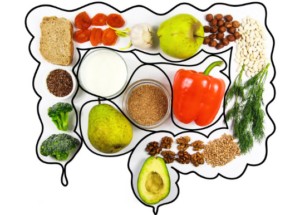Experiencing gas is a common human experience. While it’s a natural bodily function, excessive gas can lead to discomfort and embarrassment. Understanding the foods that contribute to gas and identifying alternatives can significantly improve your digestive well-being. This guide explores which foods are less likely to cause gas, providing a pathway to a more comfortable digestive experience.
Understanding Intestinal Gas
Intestinal gas originates from two primary sources: swallowed air and the fermentation of undigested carbohydrates by bacteria in the large intestine.
- Swallowed Air: Everyone swallows some air while eating and drinking. However, habits like eating quickly, chewing gum, smoking, or wearing poorly fitted dentures can increase air intake. This swallowed air often leads to burping as the body attempts to expel the excess.
- Bacterial Fermentation: The large intestine hosts a diverse community of bacteria that break down carbohydrates that the body can’t digest in the small intestine, such as certain sugars, starches, and fibers. This fermentation process produces gases like hydrogen, carbon dioxide, and sometimes methane. The specific types of bacteria present and the foods consumed influence the quantity and composition of gases produced.
Foods Less Likely to Cause Gas
While individual responses to food vary, some foods are generally less likely to produce gas. Incorporating these into your diet can help minimize gas-related discomfort.
- Lean Proteins: Meat, poultry, and fish are primarily composed of protein and fat, which produce minimal gas during digestion. Opt for lean cuts and cooking methods that don’t add excessive fats.
- Eggs: Eggs are another excellent source of protein that is generally well-tolerated and does not contribute significantly to gas production.
- Certain Vegetables: Not all vegetables are created equal when it comes to gas production. Vegetables less likely to cause gas include lettuce, tomatoes, zucchini, and okra. These vegetables are lower in fermentable carbohydrates compared to their gassier counterparts.
- Specific Fruits: While some fruits are known gas offenders, others are gentler on the digestive system. Fruits such as cantaloupe, grapes, berries, cherries, avocado, and olives are typically lower in fermentable sugars and fibers, reducing the likelihood of gas formation.
 Fruits that are less likely to cause intestinal gas
Fruits that are less likely to cause intestinal gas - Gluten-Free Grains: Carbohydrates are a common source of gas, but gluten-free options like rice bread and rice are often better tolerated. These grains are easily digestible and less prone to fermentation in the large intestine.
Foods More Likely to Cause Gas
Conversely, certain foods are notorious for causing gas due to their composition and how they are processed in the digestive system.
- Beans: Beans are a well-known culprit due to their high content of raffinose, a complex sugar that is difficult for the body to digest.
- Cruciferous Vegetables: Vegetables like broccoli, cabbage, cauliflower, and Brussels sprouts contain sulfur-containing compounds and complex carbohydrates that can lead to gas production.
- Certain Fruits: Apples, peaches, pears, and prune juice contain fructose and sorbitol, sugars that can be challenging for some people to digest.
- Dairy Products: Milk, cheese, and ice cream contain lactose, a sugar that many adults have difficulty digesting. Lactose intolerance can result in gas, bloating, and discomfort.
- Carbonated Drinks: These beverages contain a high amount of carbon dioxide, which can accumulate in the digestive tract and cause bloating and gas.
- Foods with Sorbitol: Dietetic foods, sugar-free candies, and gums often contain sorbitol, an artificial sweetener that is poorly absorbed and can lead to gas and diarrhea.
Tips for Managing Intestinal Gas
Beyond dietary choices, several strategies can help manage intestinal gas:
- Eat Slowly: Eating too quickly can lead to swallowing excess air. Taking your time and chewing food thoroughly can reduce the amount of air ingested.
- Avoid Gum and Carbonated Drinks: These habits introduce extra air into the digestive system, contributing to gas and bloating.
- Consider Lactase Supplements: If you are lactose intolerant, taking lactase supplements before consuming dairy products can aid in digestion and reduce gas.
- Identify Trigger Foods: Keep a food diary to track your meals and any associated gas symptoms. This can help you pinpoint specific foods that are problematic for you.
- Introduce High-Fiber Foods Gradually: Fiber is essential for digestive health, but adding too much too quickly can lead to gas. Gradually increase your fiber intake to allow your digestive system to adjust.
When to Seek Medical Advice
While gas is typically a normal bodily function, excessive or persistent gas accompanied by other symptoms may indicate an underlying digestive issue. Consult a healthcare professional if you experience:
- Severe abdominal pain
- Bloody stools
- Changes in bowel habits
- Unexplained weight loss
- Persistent nausea or vomiting
Conclusion
Managing intestinal gas often involves making informed dietary choices and adopting mindful eating habits. By understanding which foods are less likely to cause gas and incorporating them into your diet, you can minimize discomfort and improve your digestive well-being. Remember that individual responses to food can vary, so it’s essential to identify your trigger foods and tailor your diet accordingly.
